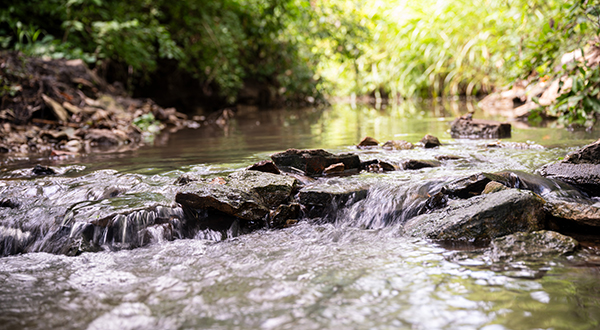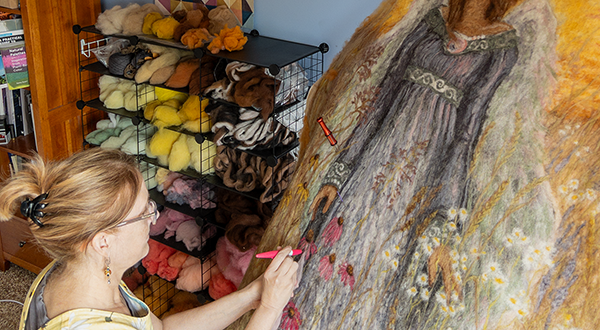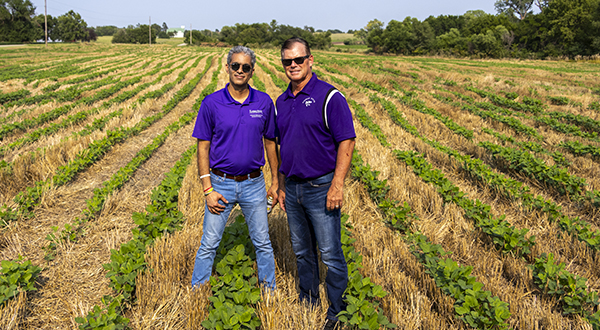When Wildcats come together, water research is better
Kansas Water Institute supports innovative and interdisciplinary water research
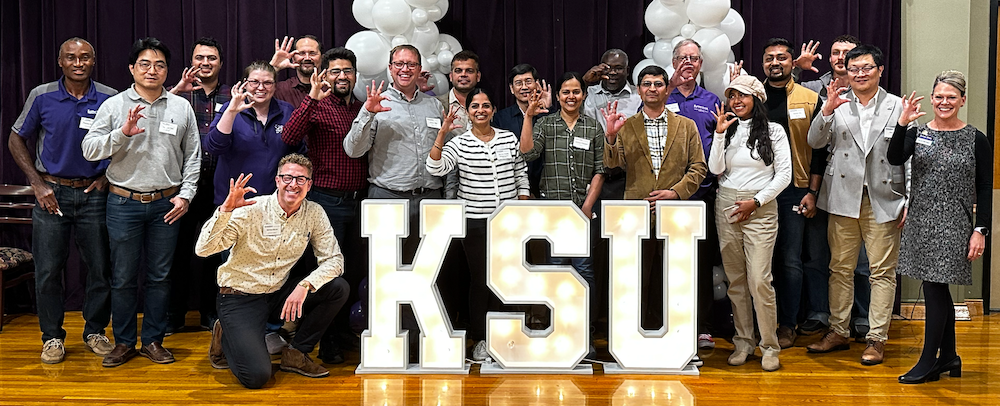
Faculty members from across the university participated in the inaugural K-State CoSearch workshop, where they collaborated across disciplines to develop water research projects. | Download this photo.
MANHATTAN — What do you get when a chemist, a statistician, a hydrologist, a humanist and an agronomist walk in to a water workshop?
This isn't a set-up to a joke; it's a question posed by the Kansas Water Institute — and the answer has a real impact on Kansans.
In November 2023, Kansas State University launched the Kansas Water Institute as part of the Next-Gen K-State strategic plan, building on what was previously known as the Kansas Water Resources Institute. The university saw an opportunity to elevate the existing institute by creating a university-level interdisciplinary institute focused on collaborative research, teaching and engagement.
Directed by Susan Metzger, who also serves as director of strategic interdisciplinary program development at K-State, the water institute develops and supports research on high-priority water resource problems, facilitates effective communication between water resource professionals, and helps disseminate and apply research results.

"At the Kansas Water Institute, we believe the most impactful solutions come from bringing diverse perspectives together," Metzger said. "Our approach helps us connect researchers, students and community leaders across disciplines to tackle the complex challenges facing Kansas water resources. These networks spark new ideas, collaborations and ultimately, real-world impact."
In just about a year and a half, the Kansas Water Institute has brought together individuals from across the university who are passionate about water research, and the ripples from those efforts are already growing.
Water Wednesdays promote collaboration across K-State
With the promise of collaboration on important water issues, the institute draws faculty, staff and students together each month for a Water Wednesday workshop. In Room 181 of Hale Library, participants enjoy a catered lunch and networking opportunities, hear lightning presentations about water research, and tackle the challenge of the month with peers at their tables.
This collaborative workshop — often marked by the laughter of shared passion and the excited conversation of interdisciplinary collaboration — is at the heart of the Kansas Water Institute's work.
All colleges at K-State have participated in Water Wednesdays, extending well beyond the agriculture and engineering faculty who have traditionally been associated with water research.
"We have people from K-State Facilities show up because water is important to them," said Melissa Harvey, marketing and communications coordinator for the institute. "We have staff members attend who want to know what the university is doing and how to support those efforts. They're all fully part of the conversation. It's not just distinguished faculty members sitting around the table — it's truly a community effort to address our water challenges."
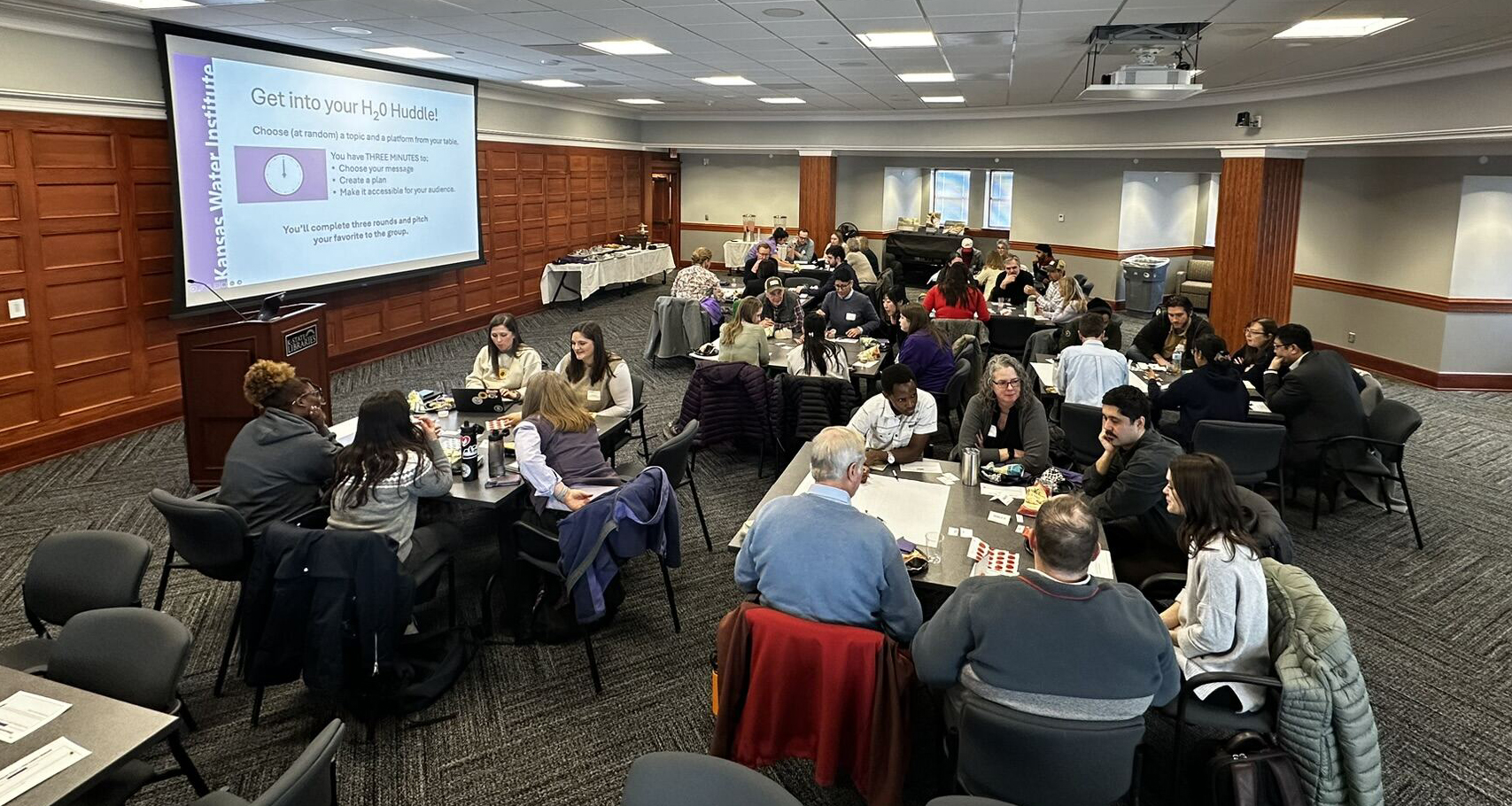
Participants at a Water Wednesdsay workshop sit in H2O Huddles for collaborative water work. | Download this photo.
The tables are filled with folks from across K-State, and the Kansas Water Institute team ensures complementary expertise at each table. Metzger acts as a research matchmaker, using registration information to assign seats for optimal collaboration.
This intentional seating enhances each workshop's activity. Participants address the topic of the month, drawing on each tablemate's unique expertise. Past challenges have included writing 15-minute grant proposals and creating social media posts about Kansas water, then sharing the results with the larger group.
Faculty across disciplines value Water Wednesday experience
Raelynne Hale is a K-State modern languages professor who studies environmental elements in Latin American literature, including plants, animals and water. She knew she wanted to participate when a colleague told her about Water Wednesdays.
She hasn't regretted it.
"Water Wednesday has been an invaluable event that helps me connect with other scholars in different disciplines who also think about water conservation, environmental issues and other environmental topics," Hale said. "It has been such a wonderful opportunity to learn about other people's research and make connections for interdisciplinary research projects. I think that having a monthly event also helps create community within the university, bringing people together from different disciplines to work on a common goal."
Hale credits Water Wednesday with directly inspiring one of her research projects. She and her colleague Maria Theresa DePaoli received funding from the Kansas Water Institute for "Bilingual Initiatives to Address Pressing Water Sustainability Challenges," a project addressing water needs in Spanish-speaking farming communities in Garden City and Dodge City.
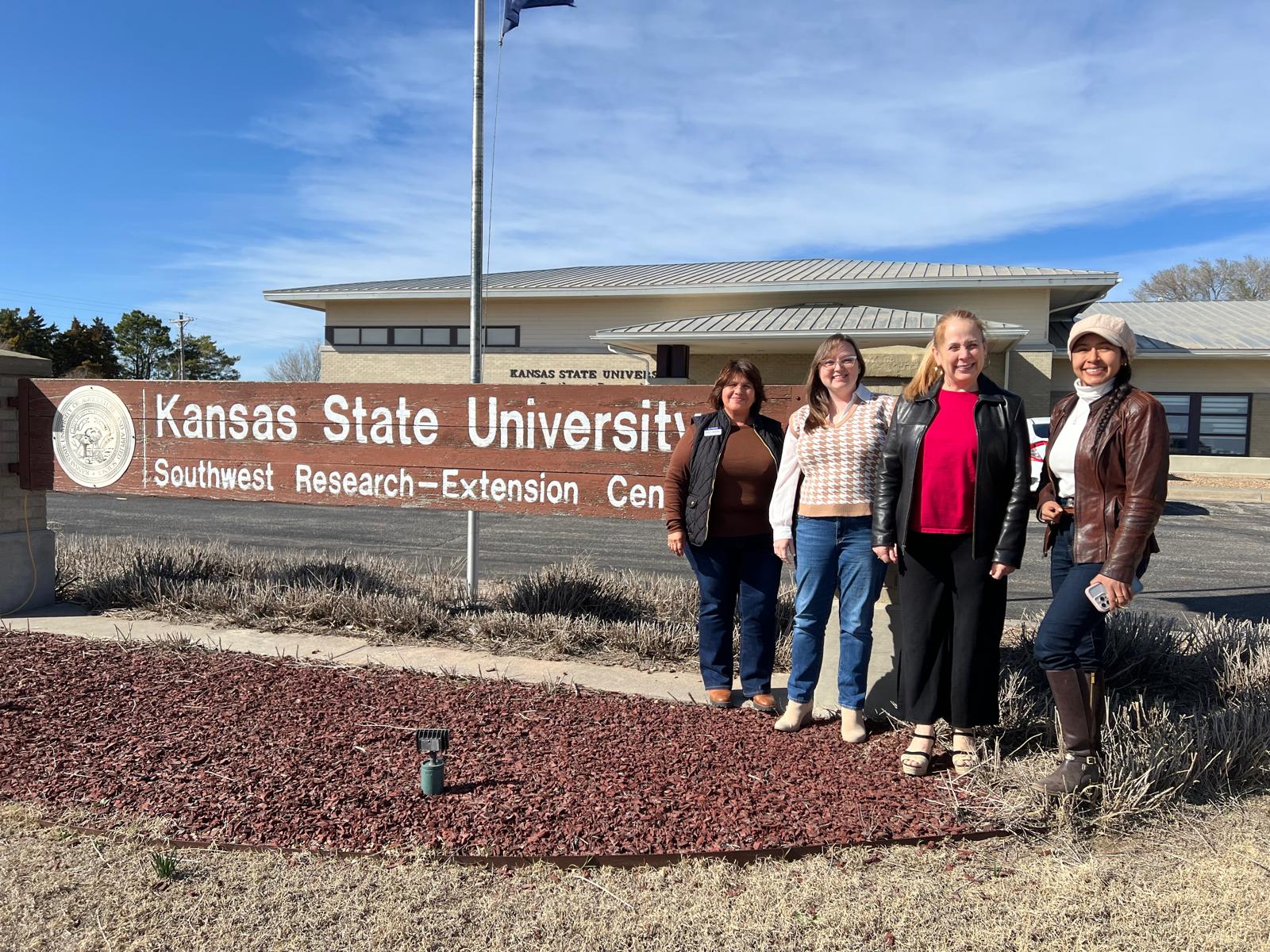
Raelynne Hale and Maria Theresa DePaoli recently traveled to Garden City to conduct interviews for their Kansas Water Institute-funded research with the help of Garden City contacts Bertha Mendoza and Rocio Reyes Esteves. From left: Mendoza, Hale, DePaoli and Esteves. | Download this photo.
After conducting interviews and gathering data with help from the Testing Ag Performance Solution, or TAPS, program to identify critical water needs in the region, Hale and DePaoli will publish their findings and use them to develop a new interdisciplinary course, Water in the Americas. Taught in Spanish, this course will explore sustainable water management from Western Kansas to Southern Chile.
The course will equip students with knowledge and skills to address water challenges in Kansas and beyond, fostering bilingual education, cross-cultural understanding and leadership in sustainable water management.
'Shark Tank' for water research: K-State CoSearch
One of the Kansas Water Institute's goals is to help faculty break out of their busy academic schedules in order to prioritize interdisciplinary research that can have community impacts. This led to the K-State CoSearch workshop, held for the first time in 2024.
During this two-day workshop, faculty created water-related research proposals and pitched their ideas to a panel of judges.
"We as researchers care about the water we drink, the water we apply in our farms and the water our ecosystems need to sustain," said Jeeban Panthi, teaching assistant professor of civil engineering and member of the HydroInk Alliance CoSearch team. "We all came to CoSearch to collaborate with multidisciplinary people to solve real problems people are facing amidst water scarcity."
To prepare participants for intense collaboration, the Kansas Water Institute team facilitated team-building activities, such as research "speed dating" and pitching intentionally terrible water research ideas to the group. Within minutes, laughter and energy filled the room, creating comfort and camaraderie for the 48-hour challenge ahead.
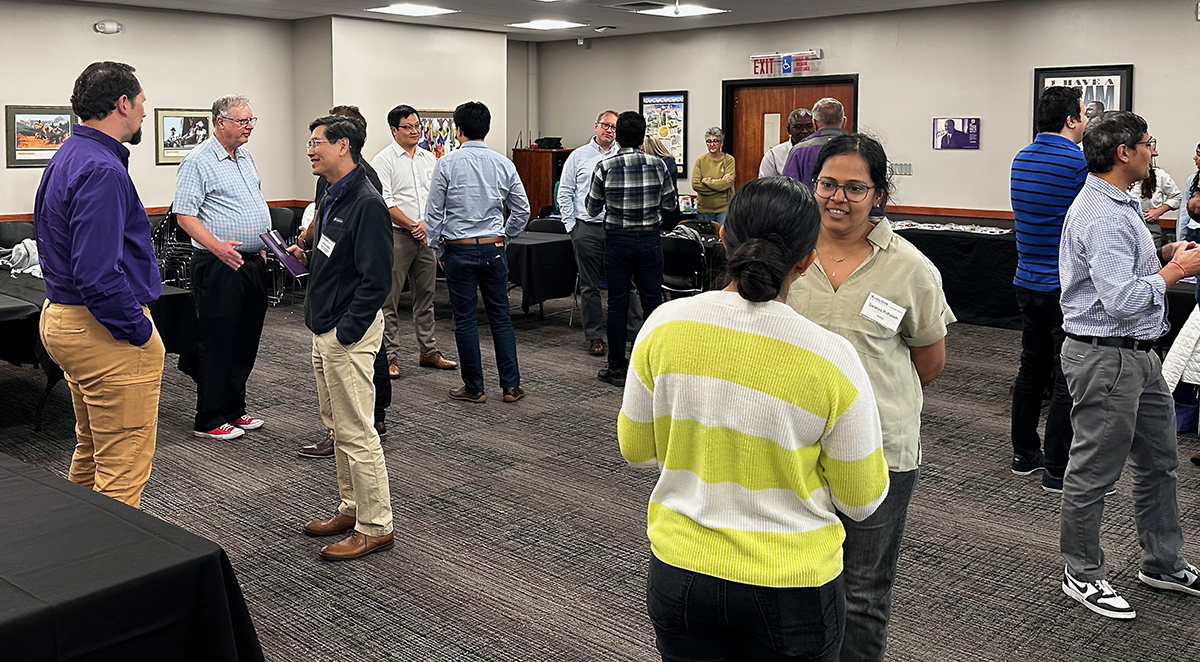
K-State CoSearch participants in the midst of research "speed dating," where they introduce themselves and their research passions. | Download this photo.
During the workshop, researchers shared their ideas, worked to narrow them down to four projects and formed teams. Some ideas merged, and some were abandoned in favor of stronger concepts.
When the project ideas were finalized, the teams got to work.
"It's like Shark Tank," Harvey said. "They had to come up with a proposal and a basic budget and then work through key questions like, 'How is this going to positively impact Kansas,' and 'How's everybody in the team going to be working?' Every person on the team had to contribute — no one could sit and passively observe; everybody had to be actively involved for a team to be successful."
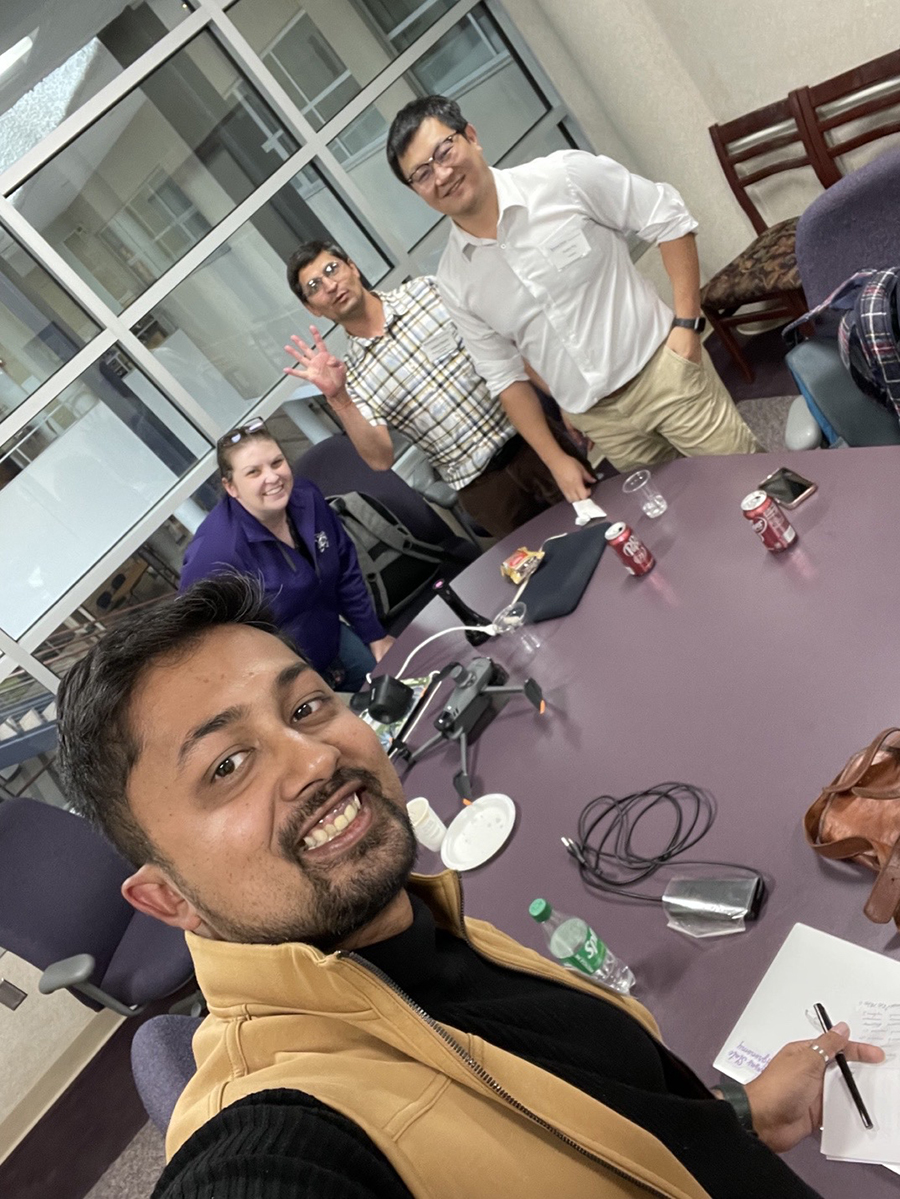
The Kansas Water Institute motivated participants through the inherent goal of advancing water research as well as the promise of some support for the winning project. Participants learned upon arrival that the support was a significant $250,000.
As teams developed their proposals, they received coaching from mentors about essential components of successful research projects and effective pitching strategies.
"CoSearch was a perfect place to bring our ideas to the table," said Amie Norton, research assistant professor of entomology and HydroInk Alliance team member. "With a few hours of discussion and lots of strategic scribbles on the whiteboard, we were able to weave in our ideas in a perfect flow of innovation and application-based research planning."
At the workshop's conclusion, each team had five minutes to pitch their proposal to a judging panel made up of members from academia and the public sector. All four teams presented innovative approaches to water challenges, with the HydroInk Alliance team winning first place and the seed funding.
CoSearch winners to assess water quantity and quality, detect hazardous chemicals
HydroInk Alliance includes Norton and Panthi; Xuan Xu, assistant professor of statistics; and Gaurav Jha, assistant professor of agronomy.
Their project addresses the urgent challenge of managing the Ogallala Aquifer, a vital yet rapidly depleting water resource that underlies eight states and is the source of irrigation for western Kansas.
"With groundwater levels dropping due to agricultural demand and climate change, contaminants like nitrates from fertilizers and uranium are migrating into vulnerable areas, risking water quality," Jha said.
The team's project combines groundwater flow and contaminant transport modeling to assess water quantity and quality, as well as nanobionic and plant tattoo sensors to detect hazardous chemicals in soil and plants. Xu said that by integrating statistical, machine learning and artificial intelligence methodologies, the project aims to provide innovative solutions for irrigation decisions.
"We'll first develop a model in western Kansas, and then we hope to collaborate with regional states for coordinated efforts on water management," Panthi said.
Xu added, "Our project and future extended research aim to facilitate more informed decision making, ensuring sustainable management of the Ogallala Aquifer."
The team has already developed a natural sensor to detect mercury in water and is hiring students and building relationships with regional partners to prepare for fieldwork.
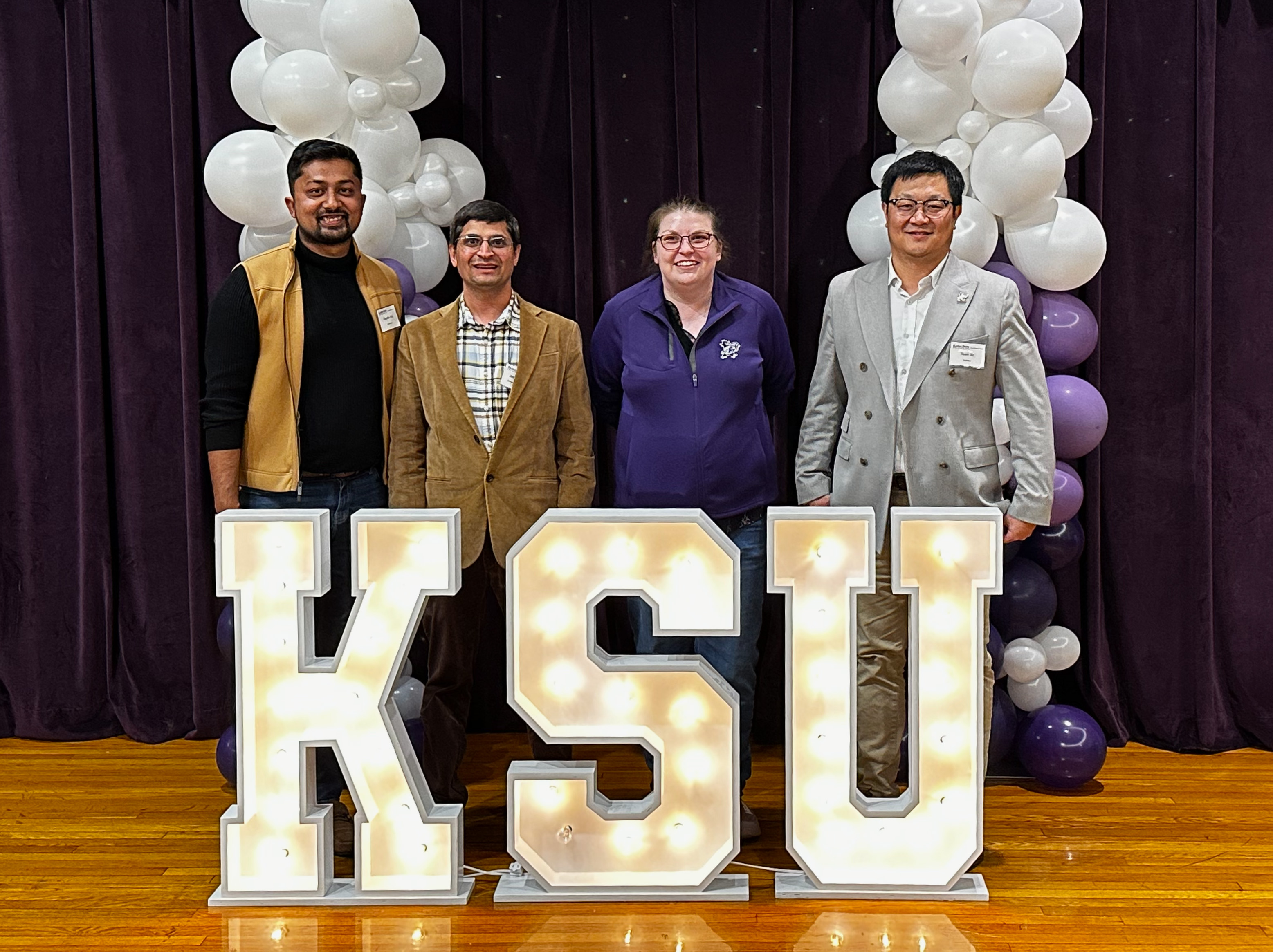
The HydroInk Alliance team took first place in the inaugural K-State CoSearch and earned $250,000 in seed funding for their project. From left: Gaurav Jha, Jeeban Panthi, Amie Norton and Xuan Xu. | Download this photo.
The research funding is a reward for a well-done workshop, and their winning project will support responsible water resource management in Kansas and beyond. For HydroInk Alliance, the collaborative connections built through the experience also provide lasting benefits, especially for newer faculty.
"I really appreciate the friendship that we have made," Norton said. "As a new faculty member, it's nice to have people you know at events and new networking opportunities. You find that you're part of the bigger K-State family, and most people are here to help you as best they can."
Kansas water innovations are world solutions
Interdisciplinary collaboration forms the foundation of the Kansas Water Institute. By leveraging expertise from across the university, water research will advance and be enhanced by the variety of disciplinary perspectives.
"There is a crossover between events like Water Wednesdays and CoSearch," Harvey said. "You're taking people out of their silos and saying, 'Okay, look at what's available here. Look at the resources.
"Look at the power of Kansas State University.'"
So what DO you get when a chemist, a statistician, a hydrologist and an agronomist walk into the Kansas Water Institute's CoSearch water workshop? Or when a modern languages professor attends Water Wednesday? Or when Wildcats put their heads together anywhere to talk water?
You get innovative, interdisciplinary solutions for the largest challenges facing Kansans and connections that lead to collaborations that will change the world.
###

